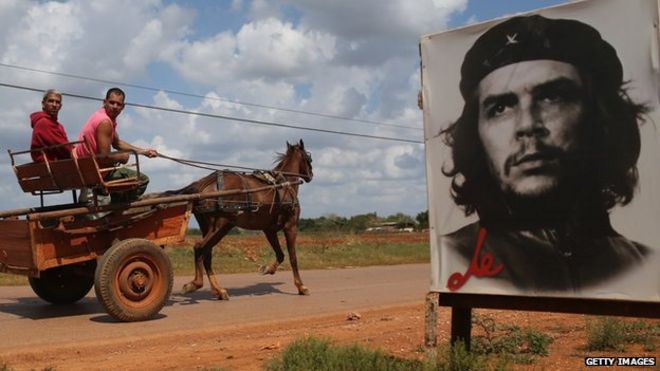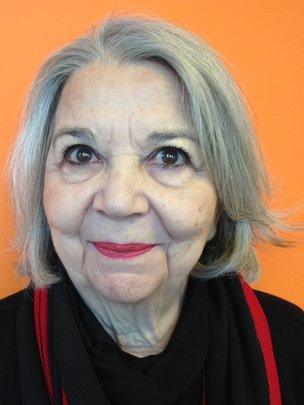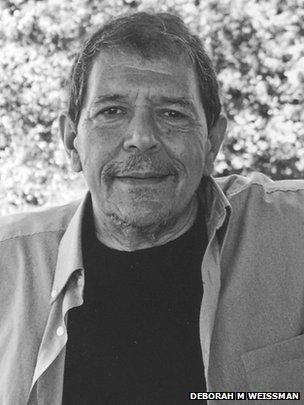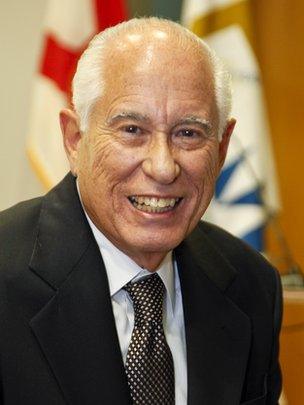Today was to be the day of the big hike I got packed up with lots of food and fruit and 5 large containers of drinks and I was at the parking lot of the base of the mountain at 8.15am…this hike is classed as very difficult and the plan was to get to the X the base of Finger rock!!!
Right from the start it was up hill
Some beautiful scenery!!!
It was getting hot and the trail was all up and it was the little loose rocks that I knew would be hard to come down.
I felt good and drank lots
I was at about 6000 feet and been hiking almost three hours and now I had to drop down into the canyon and then up again…this is what I had to go down
Finger rock is behind this big hill and I was close but I sat down and thought about all of it….I was tired, it was 90 degrees, I had seen no one on the trail and I still had a ways to go and I also knew that going down was not going to be a walk in the park and plus I did not have any hiking poles…so I ate lunch and decided it would be smart to turn around and go back and this is what I did!!!!
Coming down on the loose rocks was really hard on the knees and I did take one tumble about a 12 feet slide but no injuries….
I made it back and I was gone just over 7 hours I felt tired but good to have done what I did part of the Pearson stubborn side comes out because I did not accomplish what I wanted but the smart side of me took over so this time the mountain won!!!
I came home and took advantage of the hot tub oh those aching legs enjoyed this!!!!
I had planned to take Linda out for dinner but she wanted to rest so I went for a turkey dinner and will soon be ready for this comfy bed!!!
Interesting article!!
Would Che Guevara oppose warmer US-Cuba relations?
 The Cuban government is strengthening ties with the West, after decades of Cold War tension
The Cuban government is strengthening ties with the West, after decades of Cold War tension
Ahead of what would be an historic meeting between Cuba's President Castro and American President Obama at the Summit of the Americas in Panama, some critics ask whether warmer US-relations are a betrayal of the island's revolutionary past.
More than 50 years ago, Che Guevara became a global icon after he fought alongside Fidel and Raul Castro to overthrow a United States-backed government and put into practice their socialist ideals.
Now Raul Castro has made a deal with the US and the lifting of the long-standing economic embargo of Cuba is a realistic prospect.
Four expert witnesses offer their insights to the the BBC World Service's The Inquiry about what Che Guevara might make of these changes .
![]()
Lucia Alvarez de Toledo: Che felt 'total detestation' for US
Lucia Alvarez de Toledo is a biographer of Che Guevara.
 Lucia de Toledo says Che Guevara had a "total detestation" for what he saw as US Imperialism
Lucia de Toledo says Che Guevara had a "total detestation" for what he saw as US Imperialism
"Che is the soul of Cuba. He is the spirit of a nation, it's incredible, he's everywhere.
"He articulated what I thought. I was surrounded by all these horrible Americans, and we were like a colony, for God's sake.
"And then suddenly we produced this man who looks like us, talks like us and thinks for us, of course we love him.
"He had an absolute phobia against imperialism. The Americans owned all the banana trade. If you owned the banana company and your workers are working terribly long hours, they're not allowed to be unionised and their children are dying of malnutrition, how do you lay that at America's feet? Very easily.
"He felt total detestation [for America], because he saw how a continent that need not be poor was very poor.
"When the revolution triumphed, anybody who had been involved with the Americans quickly exited.
"There's a famous story of the Coca Cola plant: it shut down of course, and he said: 'Now you have to start it again, because you need the employment,' and they said 'Well, the formula's gone with them. He said: 'Well, try mixtures and things until you find the Coca Cola formula, and we can make Cuba Cola'. Every day somebody would bring him a sample, and he would always say 'cat's piss, go and try again'.
"[Today] Che would say that the Cuban revolution is so firmly entrenched that nobody can take that away from them, nobody can take their National Health Service, nobody can take their education. I feel very good about it because the revolution is solid.
"He would say: 'About time, they've woken up, they've realised the error of their ways.' Because it's the Americans who have realised that their behaviour didn't yield them anything, and they're now going to change."
![]()
Professor Louis Perez: US wants the Cuban people to be agents of change
Professor Louis Perez is director of Latin American studies at the University of North Carolina.
 Professor Perez says the US wants to wean Cubans off dependence on their government
Professor Perez says the US wants to wean Cubans off dependence on their government
"There was this historically-determined and culturally-conditioned belief in the United States that Cuba's destiny belongs to them. It was a place that developed during prohibition as one where one could drink freely, gamble. Basically Cuba was a tropical island that was there to serve American pleasure.
"The revolution's claim to moral legitimacy and political power was precisely its ability to make good on the claim of national sovereignty and self determination.
"In a period of 24 months, the new leadership of Cuba turned the purpose of the Cuban government into the service of Cuban interests: Cuba for Cubans.
"The overthrow of the Cuban government was the overriding purpose of US policy between 1960 and December 2014. That is, to produce economic hardship, to make life as difficult as possible for the Cuban people, in the hope that they would rise up in despair, overthrow the government and thereby provide the United States with the outcome it desired.
"The new approach seeks to empower the Cuban people, to wean them off dependence on the Cuban government so that they can serve as an internal agent for political change.
"Cuba would be overrun with American capital, American tourists and American-manufactured goods. Now what remains to be seen is the relationship the Cuban people have with that new social-economic environment.
"To get a sense of Che's response, take a look at the letter that Fidel Castro wrote [published in Cuba's state newspaper in January] in which he grudgingly supports the transition. He recognises something of an inevitable need for reconciliation with the US, but continues to be very, very wary."
![]()
Professor Carmelo Mesa-Lago: Che Guevara simply a 'myth of the past'
Carmelo Mesa-Lago is professor of economics at the University of Pittsburgh.
 Professor Mesa-Lago argues the Cuban people want the freedoms promised by these reforms
Professor Mesa-Lago argues the Cuban people want the freedoms promised by these reforms
"It was said that 98% of Cubans were in favour of the revolution. But eventually, gradually, many became disenchanted, and either left, or stayed and tried to oppose the regime, without success.
"When the Soviet Union collapsed in 1990, Cuba went into a very severe economic crisis, the worst since the Great Depression. Fidel didn't have another alternative, so had to introduce reforms: he legalised the circulation of the dollar and significantly expanded foreign tourism.
"They allowed self-employment, and an agricultural free market. All this had positive effects on the economy. Fidel never liked the market-oriented reforms, he simply didn't have another alternative.
"Cuba is privatising. They announced in 2010 that they had to dismiss 1.8m workers in the state sector. That's about 36% of the labour force.
"Now it is possible to buy or sell a house, and Cubans can have a second house in the countryside, or at the beach. The state maintains ownership of the land, but gives ten-year contracts to farmers and they can invest in the land. That Che would object to.
"Raul realised a long time ago that the system couldn't continue, but Fidel was in charge, and he couldn't go against Fidel. When he took over, gradually he began to implement the reforms.
"Che Guevara was an idealist, and he may say that Raul is betraying the revolution.
"[But] in Cuba no one is thinking about what Che Guevara may think. People simply don't want dreams. They have been supporting this system for 54 years. And they want to buy things, travel, buy a house.
"You can see portraits of Che Guevara everywhere across Latin America. Of course there is a big portrait of Che Guevara about ten stories high in the Plaza de La Revolucion, where Fidel used to address the people. But it's like a joke. This is simply a myth of the past."
![]()
Rafael Hernandez: Reforms 'in the spirit of Che'
Rafael Hernandez is chief editor of Temas, a state-funded political magazine in Havana.
"Che Guevara's views are misunderstood. We wanted not to impose the Soviet socialist model but to create a new different kind of socialist system and in that socialist system there was a legitimate presence of the private sector.
"Only in 1968 did the Cuban Revolution nationalise their remaining small business in Cuba. In other words, the Cuban Revolution lived with the private sector for nine years.
"The Cuban Revolution in 1968 had a drive towards a more radical ideological movement. In those years the question of moving towards a Communist society became part of the Cuban agenda in terms of 'we have to build socialism and communism at the same time.' That idea became predominant and made Cuba eliminate the 60,000 private businesses that remained there.
"Raul Castro is promoting a more decentralised system, and I think this is in the spirit of what Che Guevara wanted: to have a public sector that could be more efficient.
"[In a meeting with the US in 1961] Che Guevara was basically saying we won't make any changes in our system, but we are ready to discuss everything else. In the middle of the Cold War, the message Che Guevara was delivering to the Kennedy administration was 'we want peace, we want dialogue and we want to negotiate.'
"If socialism can only survive within a glass urn that then it is impossible to sustain. This morning, I was attending a panel with a crowd of youngsters and there were people there quoting Che Guevara, using him to talk about our problems. That means that his thinking is alive."
Yashi Kochi!!!























2 comments:
That was a smart decision to turn back, the desert can be very unforgiving and certainly not a safe place for risky decisions driven by ego :-)
thanks I agree,,safe journey back to you and Steve..les
Post a Comment